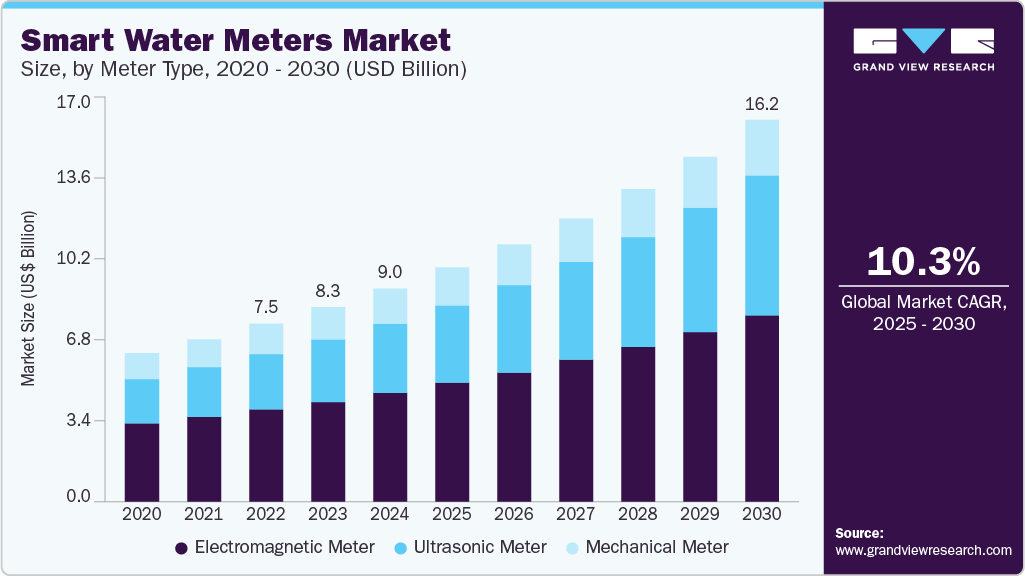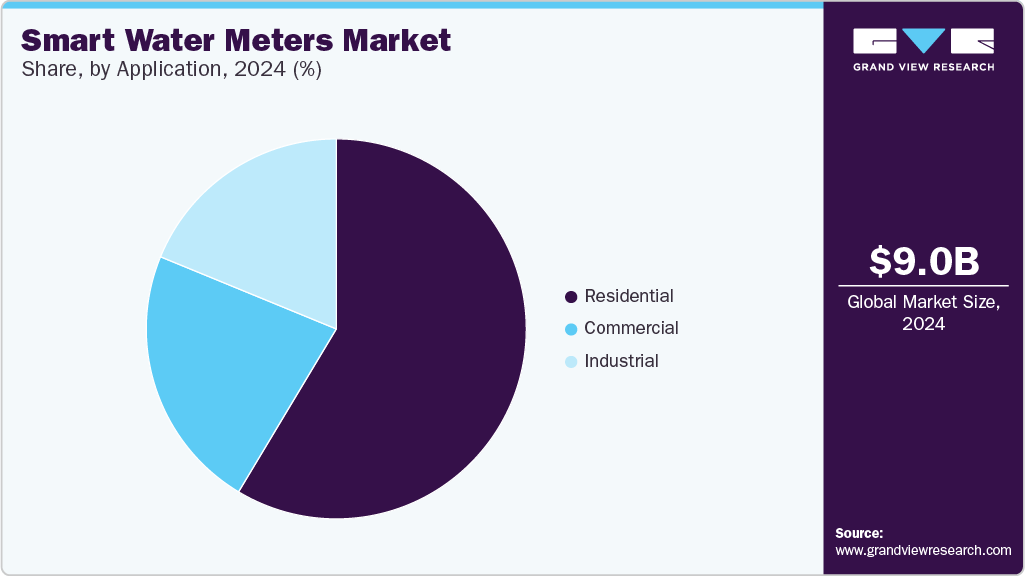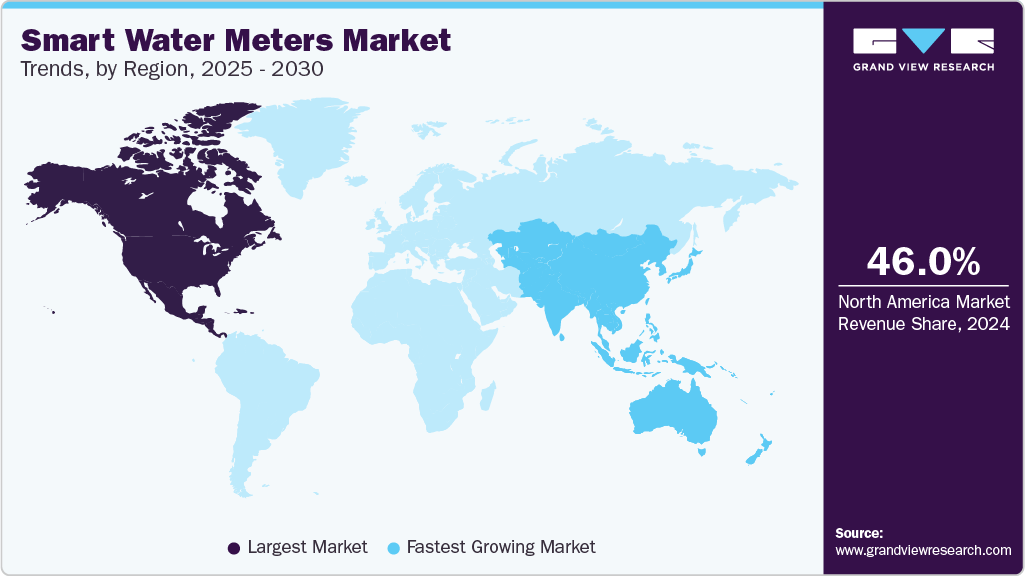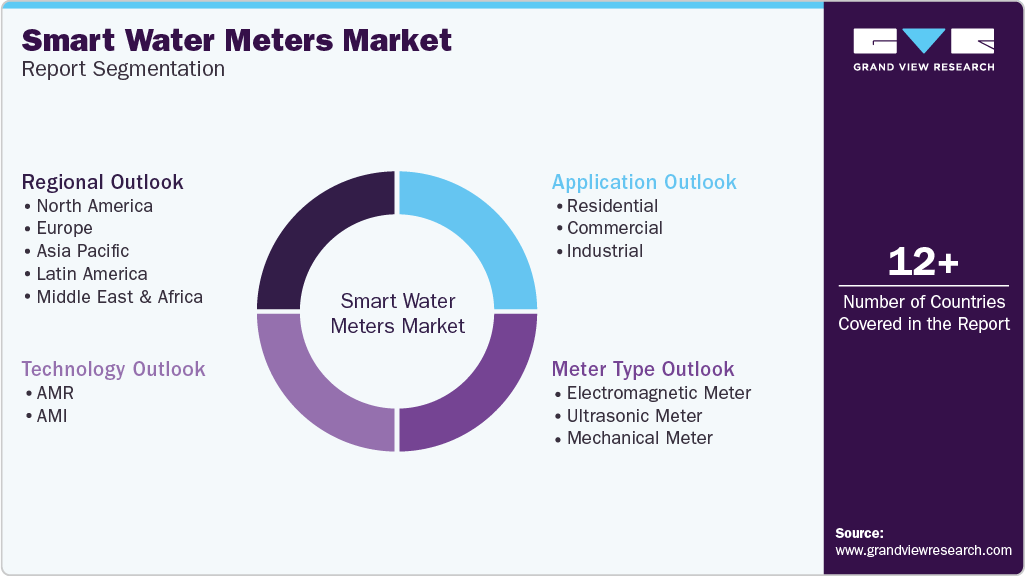- Home
- »
- Next Generation Technologies
- »
-
Smart Water Meters Market Size, Industry Report, 2030GVR Report cover
![Smart Water Meters Market Size, Share & Trends Report]()
Smart Water Meters Market (2025 - 2030) Size, Share & Trends Analysis Report By Meter Type (Electromagnetic Meter, Ultrasonic Meter, Mechanical Meter), By Technology (AMR, AMI), By Application (Residential, Industrial), By Region, And Segment Forecasts
- Report ID: GVR-4-68040-583-8
- Number of Report Pages: 100
- Format: PDF
- Historical Range: 2018 - 2023
- Forecast Period: 2025 - 2030
- Industry: Technology
- Report Summary
- Table of Contents
- Interactive Charts
- Methodology
- Download FREE Sample
-
Download Sample Report
Smart Water Meters Market Summary
The global smart water meters market size was valued at USD 9,051.3 million in 2024 and is projected to reach USD 16,190.2 million by 2030, growing at a CAGR of 10.3% from 2025 to 2030. The smart water meters industry centers on advanced metering devices designed to provide accurate, real-time monitoring of water consumption.
Key Market Trends & Insights
- North America dominated the market and accounted for 46% share in 2024.
- The smart water meters market in the U.S. experiencing significant CAGR over the forecast period.
- By meter type, the electromagnetic meter accounted for the highest revenue share of 60.4% in 2024.
- By technology, the automatic meter reading (AMR) segment accounted for the largest market revenue share in 2024.
- By application, the residential segment accounted for the largest market revenue share in 2024.
Market Size & Forecast
- 2024 Market Size: USD 9,051.3 Million
- 2030 Projected Market Size: USD 16,190.2 Million
- CAGR (2025-2030): 10.3%
- North America: Largest market in 2024
- Asia Pacific: Fastest growing market
Unlike traditional meters, smart water meters incorporate digital technology, sensors, and communication modules that enable remote data collection, leak detection, and usage alerts. These capabilities help utilities optimize water distribution, reduce losses, and improve billing accuracy, while empowering consumers to manage their water usage more efficiently.Technological advancements such as integrating IoT, AI, and data analytics enhance the functionality of smart water meters, allowing for improved data accuracy, predictive maintenance, and operational efficiency. For instance, in February 2025, Coimbatore City Municipal Corporation announced plans to implement an IoT-based smart water distribution system to ensure equitable water supply across the 40 wards added to the city after 2011. Communication technologies such as Advanced Metering Infrastructure (AMI), Radio Frequency (RF), Power Line Communication (PLC), and Broadband Over Power Lines (BPL) facilitate seamless two-way communication between meters and utilities, reducing manual labor and operational costs.

Competitive dynamics in the smart water meters industry involve established multinational corporations and specialized regional players. Companies focus on innovation, sustainability, and strategic partnerships to enhance their product offerings and expand market reach. Efforts to develop recyclable materials and biodegradable components align with broader environmental goals. Collaborations between meter manufacturers and technology providers enable the creation of integrated solutions that meet evolving market needs and support efficient water management globally.
Meter Type Insights
The electromagnetic meter accounted for the highest revenue share of 60.4% in 2024. This growth is driven by its high accuracy, long-term stability, and ability to measure flow without moving parts. These meters are ideal for larger pipe sizes and challenging water conditions, making them suitable for urban and industrial applications. Their compatibility with remote data transmission and integration into smart water management systems further drives adoption. As water utilities shift toward digitalization and efficiency, demand for electromagnetic meters continues to rise globally.
The ultrasonic meter registered a CAGR of 12.4% from 2025 to 2030. Ultrasonic water meters are seeing increasing adoption as utilities and municipalities seek more accurate and maintenance-free solutions for water measurement. Their non-mechanical design ensures long-term durability and consistent performance without wear and tear. These meters are ideal for smart water management, offering real-time data collection and remote monitoring capabilities. The shift toward digital infrastructure and smart city initiatives is a key driver behind their growth. Growing concerns over water conservation and regulatory compliance encourage water utilities to replace traditional meters with ultrasonic models. This trend is expected to continue as utilities modernize their infrastructure.
Technology Insights
The automatic meter reading (AMR) segment accounted for the largest market revenue share in 2024. The growth is driven by the growing need for efficient water management and the reduction of non-revenue water through accurate, real-time data collection. Rising urbanization and infrastructure development are prompting utilities to modernize metering systems. AMR also reduces manual labor and operational costs while minimizing human error. Regulatory pressures and sustainability goals are pushing utilities toward digital water solutions. Additionally, consumer demand for transparent billing and consumption tracking supports AMR adoption.
The advance meter infrastructure (AMI) segment is projected to grow significantly over the forecast period. Advanced water meters are driving the growth of the smart water meter market by enabling real-time data collection, leak detection, and remote monitoring. These features improve water management efficiency, reduce operational costs, and support sustainable resource usage. Utilities are increasingly adopting advanced meters to enhance billing accuracy and meet regulatory standards. The integration with IoT platforms further accelerates market expansion.
Application Insights
The residential segment accounted for the largest market revenue share in 2024. The growth is driven due to rising awareness of water conservation and the need for accurate billing. These meters enable real-time water usage monitoring, helping households detect leaks and reduce wastage. Government regulations and smart city initiatives are further driving their deployment. The market is expected to grow steadily with IoT and data analytics advancements. For instance, in March 2025, Hidroconta installed 136 NB-IoT-enabled Centaurus smart water meters in Valencia’s Cruz de Gracia area, enabling real-time monitoring, leak detection, and efficient water use. Integrated with the Demeter platform, the project supports sustainable management and smart city goals.

The industrial segment is projected to grow significantly over the forecast period. This segment is driven due to their ability to provide real-time water usage data, detect leaks, and improve operational efficiency. Industries benefit from better resource management and compliance with environmental regulations. The integration of IoT and analytics enables predictive maintenance and cost savings. As sustainability becomes a priority, demand for smart metering solutions in manufacturing and processing sectors is growing rapidly.
Regional Insights
North America dominated the market and accounted for 46% share in 2024. The adoption of smart water meters in North America is driven by a combination of infrastructure, environmental, and technological factors. A major driver is the region's aging water infrastructure, which has led utilities to seek modern solutions to minimize leaks and improve operational efficiency. Smart meters play a crucial role in enabling real-time monitoring and proactive maintenance. Water scarcity, particularly in drought-prone areas such as California and the Southwest, has intensified the need for precise consumption tracking and conservation, with regulations and tiered pricing models further supporting this shift.

U.S. Smart Water Meters Market Trends
The smart water meters market in the U.S. is driven by the growing availability of federal and state infrastructure funding, particularly through the Infrastructure Investment and Jobs Act (IIJA), which allocates billions toward upgrading water systems. This funding creates a financial window for municipalities and utilities to invest in smart metering without bearing the full cost burden. The market is also driven by the infrastructure modernization efforts aimed at boosting operational efficiency and cutting costs for utilities. Additionally, the Bipartisan Infrastructure Law is playing a key role by providing substantial funding to upgrade water systems, further accelerating the adoption of smart metering technologies across the country.
Europe Smart Water Meters Market Trends
The smart water meters market in Europe is experiencing prominent growth, driven by the governments across the country are spreading out strict regulations and incentives to accelerate smart water meter adoption. The EU’s Energy Efficiency Directive and Water Framework Directive set the framework for these initiatives. These policies target reductions in non-revenue water and overall water consumption. The combined regulatory push aims to enhance efficiency and bolster resilience against water scarcity. These combined measures help European utilities maintain their smart water management systems' integrity, availability, and confidentiality.
Asia Pacific Smart Water Meters Market Trends
Asia Pacific is anticipated to register the fastest CAGR over the forecast period. It is expanding rapidly, due to increasingly adopting smart meters as part of their broader efforts to enhance water management and improve sustainability outcomes. The integration of smart meters is a critical element in the region's digital transformation strategies, which focus on incorporating more advanced technologies into infrastructure management. The rapid growth of smart cities in countries further accelerates the demand for smart water metering solutions, as these cities prioritize the implementation of digital technologies to enhance urban infrastructure and promote sustainability.
Key Smart Water Meters Market Company Insights
Prominent firms have used product launches and developments, followed by expansions, mergers and acquisitions, contracts, agreements, partnerships, and collaborations as their primary business strategy to increase their market share. The companies have used various techniques to enhance market penetration and boost their position in the competitive industry.
-
Honeywell International Inc. offers solutions and innovation through Aerospace Technologies, Building Automation, Energy and Sustainability Solutions, and Industrial Automation business segments. Honeywell International Inc. offers smart water meter applications and solutions under Elster, which is fully acquired by the company. Elster is a German company that develops electricity, water, and gas metering solutions for commercial and residential customers. Also, delivers solutions to metering-related communication, networking, and software solutions. The company operates in three business segments: gas metering, electricity metering, and water metering solutions.
-
Landis+Gyr is a metering solution provider for gas, water, electricity, and energy measurement for utilities. The company supplies, designs, and manufactures commercial, industrial, residential, and optical probes, grid meters, and electricity data recorders. Additionally, it offers energy metering & management software, hardware, and data management with water, gas and electricity meter. It also provides communications network support, automated meter management, and advanced metering infrastructure installation.
Key Smart Water Meters Companies:
The following are the leading companies in the smart water meters market. These companies collectively hold the largest market share and dictate industry trends.
- Aclara Technologies LLC. (Hubbell)
- BMETERS Srl
- Diehl Stiftung & Co. KG
- Datamatics Global Services Limited
- Honeywell International Inc.
- Badger Meter, Inc.
- Itron Inc.
- Kamstrup A/S
- Landis+Gyr.
- Xylem (Sensus)
- Neptune Technology Group Inc.
- ZENNER International GmbH & Co. KG
Recent Developments
-
In March 2024, BMETERS proudly announces the launch of the HYDRODIGIT-M1, a new smart digital multi-jet water meter featuring an 8-digit digital display, inductive transmission, and integrated wireless M-BUS and LoRa modules. Designed for both cold and hot water applications with sizes ranging from DN15 to DN50, the HYDRODIGIT-M1 offers a 360° rotating dial for ease of reading.
-
In March 2023, STACKFORCE GmbH and Diehl Metering formed a strategic alliance to enhance their joint efforts in smart metering and IoT connectivity. By merging STACKFORCE's expertise in IoT and low-power wide-area (LPWA) radio technologies with Diehl Metering's strengths in smart metering and smart city solutions, the partnership seeks to drive innovation and promote broader global adoption of the mioty LPWAN standard.
Smart Water Meters Market Report Scope
Report Attribute
Details
Market size in 2025
USD 9,938.5 million
Revenue forecast in 2030
USD 16,190.2 million
Growth rate
CAGR of 10.3% from 2025 to 2030
Base year for estimation
2024
Historical data
2018 - 2023
Forecast period
2025 - 2030
Quantitative units
Revenue in USD million/billion, and CAGR from 2025 to 2030
Report coverage
Revenue forecast, company ranking, competitive landscape, growth factors, and trends
Segments covered
Meter Type, technology, application, region
Regional scope
North America; Europe; Asia Pacific; Latin America; MEA
Country scope
U.S.; Canada; Mexico; UK; Germany; France; China; Japan; India; South Korea; Australia; Brazil; KSA; UAE; South Africa
Key companies profiled
Aclara Technologies LLC. (Hubbell); BMETERS Srl ; Diehl Stiftung & Co. KG; Datamatics Global Services Limited; Honeywell International Inc; Badger Meter, Inc.; Itron Inc.; Kamstrup A/S; Landis+Gyr.; Xylem (Sensus); Neptune Technology Group Inc.; ZENNER International GmbH & Co. KG
Customization scope
Free report customization (equivalent up to 8 analysts working days) with purchase. Addition or alteration to country, regional & segment scope.
Pricing and purchase options
Avail customized purchase options to meet your exact research needs. Explore purchase options
Global Smart Water Meter Market Report Segmentation
This report forecasts revenue growth at global, regional, and country levels and provides an analysis of the latest industry trends in each of the sub-segments from 2018 to 2030. For this study, Grand View Research has segmented the global smart water meters market report based on meter type, technology, application, and region.

-
Meter Type Outlook (Revenue, USD Million, 2018 - 2030)
-
Electromagnetic Meter
-
Ultrasonic Meter
-
Mechanical Meter
-
-
Technology Outlook (Revenue, USD Million, 2018 - 2030)
-
AMR
-
AMI
-
-
Application Outlook (Revenue, USD Million, 2018 - 2030)
-
Residential
-
Commercial
-
Industrial
-
-
Regional Outlook (Revenue, USD Million, 2018 - 2030)
-
North America
-
U.S.
-
Canada
-
Mexico
-
-
Europe
-
UK
-
Germany
-
France
-
-
Asia Pacific
-
China
-
Japan
-
India
-
South Korea
-
Australia
-
-
Latin America
-
Brazil
-
-
Middle East and Africa (MEA)
-
KSA
-
UAE
-
South Africa
-
-
Frequently Asked Questions About This Report
b. The global smart water meters market size was estimated at USD 9051.3 million in 2024 and is expected to reach USD 9938.5 million in 2025.
b. The global smart water meters market is expected to grow at a compound annual growth rate of 10.3% from 2025 to 2030 to reach USD 16,190.2 million by 2030.
b. North America dominated the smart water meters market with a share of 46% in 2024. This is attributable to rising healthcare awareness coupled with cloud-based technologies and constant research and development initiatives.
b. Some key players operating in the smart water meters market include Aclara Technologies LLC. (Hubbell); BMETERS Srl; Diehl Stiftung & Co. KG ; Datamatics Global Services Limited ; Honeywell International Inc.; Badger Meter, Inc.; Itron Inc.; Kamstrup A/S; Landis+Gyr.; Xylem (Sensus); Neptune Technology Group Inc.; ZENNER International GmbH & Co. KG
b. Key factors that are driving the market growth include Technological advancements such as integrating IoT, AI, and data analytics enhance the functionality of smart water meters, allowing for improved data accuracy, predictive maintenance, and operational efficiency.
Share this report with your colleague or friend.
Need a Tailored Report?
Customize this report to your needs — add regions, segments, or data points, with 20% free customization.

ISO 9001:2015 & 27001:2022 Certified
We are GDPR and CCPA compliant! Your transaction & personal information is safe and secure. For more details, please read our privacy policy.
Trusted market insights - try a free sample
See how our reports are structured and why industry leaders rely on Grand View Research. Get a free sample or ask us to tailor this report to your needs.










